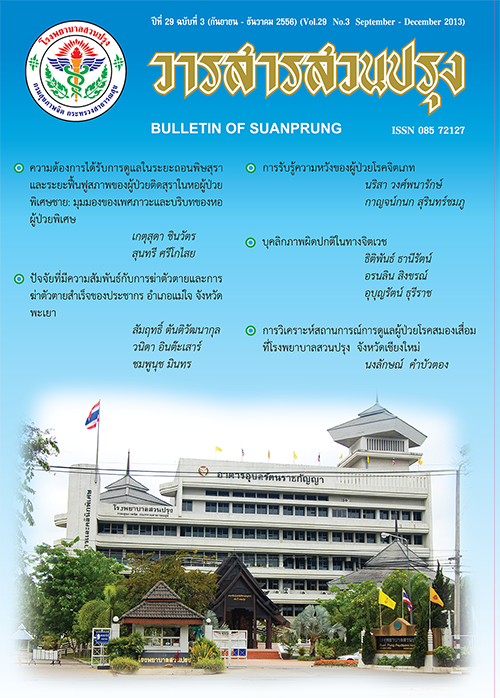ประสบการณ์ด้านจิตใจในการฟื้นพลังของเยาวชนที่ไม่กระทำผิดซ้ำ (Psychological experiences of resilience in juvenile offenders without parole violation)
Main Article Content
Abstract
การวิจัยมีวัตถุประสงค์เพื่อศึกษาประสบการณ์ด้านจิตใจในการฟื้นพลังของเยาวชนที่ไม่กระทำผิดซ้ำ ที่ศาลเยาวชนและครอบครัว จำนวน 7 ราย โดยคัดเลือกแบบเจาะจง มีเกณฑ์การคัดเลือก คือ เป็นเยาวชนที่ไม่กระทำผิดซ้ำเกิน 1 ปีหลังคำตัดสินจากศาลเยาวชนฯ อยู่มาตรการมอบตัวให้บิดามารดา โดยมีเงื่อนไขคุมประพฤติ ซึ่งถูกดำเนินคดีอายุ 15-17 ปี คะแนนเฉลี่ยจากแบบวัดความสามารถในการฟื้นพลัง 2.50 ขึ้นไป ไม่มีอาการทางจิตเวช และยินดีเข้าร่วมการวิจัย การเก็บข้อมูลโดยการสัมภาษณ์รายบุคคล เครื่องมือที่ใช้ แบบวัดความสามารถในการฟื้นพลัง คำถามสัมภาษณ์ บันทึกภาคสนาม เครื่องอัดเสียง การวิเคราะห์ข้อมูลตามแนวการวิจัยเชิงคุณภาพแนวปรากฏการณ์วิทยาเชิงตีความ
ผลการวิจัยพบ 4 ประเด็น (1) ภาวะมืดมนช่วงเยาวชนทำผิด เยาวชนมีพฤติกรรม ความคิดที่ไม่เหมาะสม มีมุมมองทางลบ และอยู่ในสภาพแวดล้อมที่นำไปสู่การทำผิด (2) ปัจจัยชักนำให้เยาวชนกลับเข้ามาในเส้นทางแสงสว่าง บุคคลภายนอกช่วยเหลือ เกิดการจุดประกายภายในตน การอยากพัฒนาตนเองต่อเนื่อง (3) จัดการให้ตนเข้ามาเส้นทางแสงสว่าง คิดทบทวน ลงมือทำสิ่งดี อดทนต่อปัญหา (4) ชีวิตที่ดีในเส้นทางแสงสว่าง มีมุมมองทางบวกต่อตนเอง มีสัมพันธภาพที่ดีกับคนรอบข้าง
สรุปสิ่งสำคัญที่ทำให้เยาวชนไม่กระทำผิดซ้ำ คือ บุคคลรอบข้างคอยช่วยเหลือ ทำให้เยาวชนเกิดความรู้สึกดีกับชีวิต เยาวชนจึงพัฒนาทักษะให้ชีวิตของตนเองดีขึ้น ดังนั้นผู้ดูแลเยาวชนที่กระทำผิดควรช่วยเหลือเยาวชนโดยการให้ความรักและสอนแนวทางในการดำเนินชีวิตที่ถูกต้อง
The objective of this study was to examine the psychological experiences of resilience in juvenile offenders without parole violation. There were 7 key informants who met inclusion criteria which were juvenile offenders without parole violation at least for 1 year, participated in act 138, age 15-17 years when facing prosecution, average score from resilience scale above 2.50, had no psychological disorder, fluently communicated in Thai, and willing to participate in this research. Research tools consisted of Resilience scale, interview questions, field notes, and recorders. Transcribed data was analyzed via Interpretative Phenomenological Analysis method.
The analysis revealed four main themes including: (1) Darkness moment of delinquent behavior which consisted of inappropriate behaviors, inappropriate thought patterns, negative attitudes, and the effects of the environment on delinquent behaviors; (2) Factors related to behavioral changes which consisted of external factors, internal factors, and factors that motivate juvenile offenders to improve themselves continuously; (3) behavioral changes which consisted of considering and evaluating their behaviors, managing themselves to do the right things, and resisting to temptation; (4) Living a good life on the right direction which consisted of having positive self-perception and having good relationships with others.
In conclusion, an effective factor for Juvenile Offenders to live without Parole Violation is supportive external factor, especially those who are around, which make them feel more positive about their lives, thus motivate them to improve themselves. The finding suggests that we should support juvenile offenders with love and teach them the right path of life.
Article Details
บทความหลังผ่านการปรับแก้จากกองบรรณาธิการแล้ว เป็นลิขสิทธ์ของวารสารจิตเวชวิทยาสาร โรงพยาบาลสวนปรุง กรมสุขภาพจิต กระทรวงสาธารณสุข ห้ามเผยแพร่เพื่อประโยชน์ทางการค้าโดยไม่ได้รับอนุญาต แต่อนุญาตให้เผยแพร่บทความดังกล่าวเพื่อประโยชน์ทางการศึกษาแก่ประชาชนทั่วไป ทั้งนี้กองบรรณาธิการไม่จำเป็นต้องเห็นด้วยกับบทความหรือข้อคิดเห็นใดๆ ที่ปรากฏในวารสารสวนปรุง

